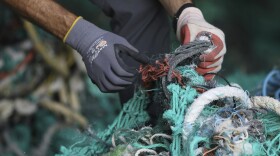Last week’s arrest of members of a Hawaiian sovereignty group brought up an often asked question in the Hawaiian community: “Who exactly speaks for native Hawaiians?” The answer may be more complex than imagined.
When a dozen or so members of a Hawaiian sovereignty group took by force the front desk at the Office of Hawaiian Affairs? headquarters in Honolulu,Andre Perez was there. The Hawaiian independence activist and cultural practitioner approached the men and caught it all on tape.
“I support Hawaiian self-determination, and direct action and Hawaiians taking matters into their own hands. So I wasn’t ready to immediately condemn them,” says Perez, “I just don’t think it was a realistic approach.”
Thirteen men from the self-proclaimed Hawaiian independence group known as the Kingdom of Atooi attempted to seize control of OHA’s office and assets and to arrest OHA trustees in the name of the overthrown Kingdom of Hawai’i.
“There was nothing about what they did that I think is in any way representative of the way that the Hawaiian Independence movement has been carried for the last 30, 40 years,” says Noelani Goodyear-Ka??pua, a political science professor at UH Manoa.
She’s been an active member of various Hawaiian independence groups since the early 90s.
“What they did is actually really setting us behind. Because what they’ve done now is created an excuse for law enforcement to come down harder on non-violent, direct action,” says Goodyear-Ka??pua.
Activism has been a catalyst for change in the Hawaiian community since the overthrow of the Hawaiian Kingdom in 1893. The Kaua’i-based Kingdom of Atooi is one of an estimated ten groups attempting to exercise independence and self-governance.
“I think the reason why we have so many self-proclaimed monarchs within our native Hawaiian community is because that very question...it?s a tough one,” says Kuhio Lewis, a former OHA employee and head of the Council for Native Hawaiian Advancement.
Lewis admits there are oftentimes challenges to any one entity’s ability to adequately represent such a diverse native Hawaiian community.
“I mean who is in charge? Who is our ali?i? Who is representing the voice of the Hawaiian people. Not easy question to answer,” says Lewis.
“Unfortunately, we were dispossed. We cannot ever forget that,” says former native Hawaiian legislator Brickwood Galuteria.
He served in the state senate for a decade and has long been an advocate of working within the system to create change.
“But we should use that as an impetus to get to leadership roles to this particular government,” says Galuteria, “That’show you impact policy, which impacts change.”
“The easy answer is…easy to say, hard to do…is for Hawaiians to put down our differences and come together,” says Perez, “Of course, trying to actually do that is much more difficult.”
One thing that everyone we spoke to can agree on is that self-determination is the final destination.




